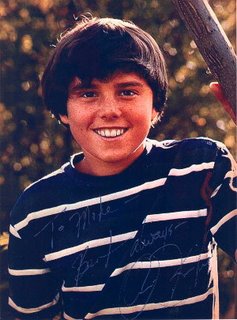NYT Da Vinci Code Review This is the New York Times review of The Da Vinci Code, written by A. O. Scott. This is brilliant and hysterical writing. I am totally using this without permission, but let me just say that more people should be reading The New York Times. You can register for free and read more great writing like this.
This is the New York Times review of The Da Vinci Code, written by A. O. Scott. This is brilliant and hysterical writing. I am totally using this without permission, but let me just say that more people should be reading The New York Times. You can register for free and read more great writing like this.
A 'Da Vinci Code' That Takes Longer to Watch Than ReadBy A.O. Scott
Published: May 17, 2006CANNES, France, May 17 — It seems you can't open a movie these days without provoking some kind of culture war skirmish, at least in the conflict-hungry media. Recent history — "The Passion of the Christ," "The Chronicles of Narnia" — suggests that such controversy, especially if religion is involved, can be very good business. "The Da Vinci Code," Ron Howard's adaptation of Dan Brown's best-selling primer on how not to write an English sentence, arrives trailing more than its share of theological and historical disputation.
The arguments about the movie and the book that inspired it have not been going on for millennia — it only feels that way — but part of Columbia Pictures' ingenious marketing strategy has been to encourage months of debate and speculation while not allowing anyone to see the picture until the very last minute. Thus we have had a flood of think pieces on everything from Jesus and Mary Magdalene's prenuptial agreement to the secret recipes of Opus Dei, and vexed, urgent questions have been raised: Is Christianity a conspiracy? Is "The Da Vinci Code" a dangerous, anti-Christian hoax? What's up with Tom Hanks's hair?
Luckily I lack the learning to address the first two questions. As for the third, well, it's long, and so is the movie. "The Da Vinci Code," which opened the Cannes Film Festival on Wednesday, is one of the few screen versions of a book that may take longer to watch than to read. (Curiously enough Mr. Howard accomplished a similar feat with "How the Grinch Stole Christmas" a few years back.)
To their credit the director and his screenwriter, Akiva Goldsman (who collaborated with Mr. Howard on "Cinderella Man" and "A Beautiful Mind"), have streamlined Mr. Brown's story and refrained from trying to capture his, um, prose style. "Almost inconceivably, the gun into which she was now staring was clutched in the pale hand of an enormous albino with long white hair." Such language — note the exquisite "almost" and the fastidious tucking of the "which" after the preposition — can live only on the page.
To be fair, though, Mr. Goldsman conjures up some pretty ripe dialogue all on his own. "Your God does not forgive murderers," Audrey Tautou hisses to Paul Bettany (who play a less than enormous, short-haired albino). "He burns them!"
Theology aside, this remark can serve as a reminder that "The Da Vinci Code" is above all a murder mystery. And as such, once it gets going, Mr. Howard's movie has its pleasures. He and Mr. Goldsman have deftly rearranged some elements of the plot (I'm going to be careful here not to spoil anything), unkinking a few over-elaborate twists and introducing others that keep the action moving along.
Hans Zimmer's appropriately overwrought score, pop-romantic with some liturgical decoration, glides us through scenes that might otherwise be talky and inert. The movie does, however, take a while to accelerate, popping the clutch and leaving rubber on the road as it tries to establish who is who, what they're doing and why.
Briefly stated: An old man (Jean-Pierre Marielle) is killed after hours in the Louvre, shot in the stomach, almost inconceivably, by a hooded assailant. Meanwhile Robert Langdon (Mr. Hanks), a professor of religious symbology at Harvard, is delivering a lecture and signing books for fans. He is summoned to the crime scene by Bezu Fache (Jean Reno), a French policemen who seems very grouchy, perhaps because his department has cut back on its shaving cream budget.
Soon Langdon is joined by Sophie Neveu, a police cryptographer and also — Bezu Fache! — the murder victim's granddaughter. Grandpa, it seems, knew some very important secrets, which if they were ever revealed might shake the foundations of Western Christianity, in particular the Roman Catholic Church, one of whose bishops, the portly Aringarosa (Alfred Molina) is at this very moment flying on an airplane. Meanwhile the albino monk, whose name is Silas and who may be the first character in the history of motion pictures to speak Latin into a cellphone, flagellates himself, smashes the floor of a church and kills a nun.
A chase, as Bezu's American colleagues might put it, ensues. It skids through the nighttime streets of Paris and eventually to London the next morning, with side trips to a Roman castle and a chateau in the French countryside. Along the way the film pauses to admire various knickknacks and art works, and to flash back, in desaturated color, to traumatic events in the childhoods of various characters (Langdon falls down a well; Sophie's parents are killed in a car accident; Silas stabs his abusive father).
There are also glances further back into history, to Constantine's conversion, to the suppression of the Knights Templar and to that time in London when people walked around wearing powdered wigs.
Through it all Mr. Hanks and Ms. Tautou stand around looking puzzled, leaving their reservoirs of charm scrupulously untapped. Mr. Hanks twists his mouth in what appears to be an expression of professorial skepticism and otherwise coasts on his easy, subdued geniality. Ms. Tautou, determined to ensure that her name will never again come up in an Internet search for the word "gamine," affects a look of worried fatigue.
In spite of some talk (a good deal less than in the book) about the divine feminine, chalices and blades, and the spiritual power of sexual connection, not even a glimmer of eroticism flickers between the two stars. Perhaps it's just as well. When a cryptographer and a symbologist get together, it usually ends in tears.
But thank the deity of your choice for Ian McKellen, who shows up just in time to give "The Da Vinci Code" a jolt of mischievous life. He plays a wealthy and eccentric British scholar named Leigh Teabing. (I will give Mr. Brown this much: he's good at names. If I ever have twins or French poodles, I'm calling them Bezu and Teabing for sure.)
Hobbling around on two canes, growling at his manservant, Remy (Jean-Yves Berteloot), Teabing is twinkly and avuncular one moment, barking mad the next. Sir Ian, rattling on about Italian paintings and medieval statues, seems to be having the time of his life, and his high spirits serve as something of a rebuke to the filmmakers, who should be having and providing a lot more fun.
Teabing, who strolls out of English detective fiction by way of a Tintin comic, is a marvelously absurd creature, and Sir Ian, in the best tradition of British actors slumming and hamming through American movies, gives a performance in which high conviction is indistinguishable from high camp. A little more of this — a more acute sense of its own ridiculousness — would have given "The Da Vinci Code" some of the lightness of an old-fashioned, jet-setting Euro-thriller.
But of course movies of that ilk rarely deal with issues like the divinity of Jesus or the search for the Holy Grail. In the cinema such matters are best left to Monty Python. In any case Mr. Howard and Mr. Goldsman handle the supposedly provocative material in Mr. Brown's book with kid gloves, settling on an utterly safe set of conclusions about faith and its history, presented with the usual dull sententiousness.
So I certainly can't support any calls for boycotting or protesting this busy, trivial, inoffensive film. Which is not to say I'm recommending you go see it.
If I could see Poseidon twice*, I can see this once. *Yeah, I saw it twice—have you seen Josh Lucas’ eyes? Beautiful. And the ship turning over is worth seeing again. Other than that, don’t think about it much because it really wasn’t that great (but neither was the original and I’ve seen that several dozen times…)















